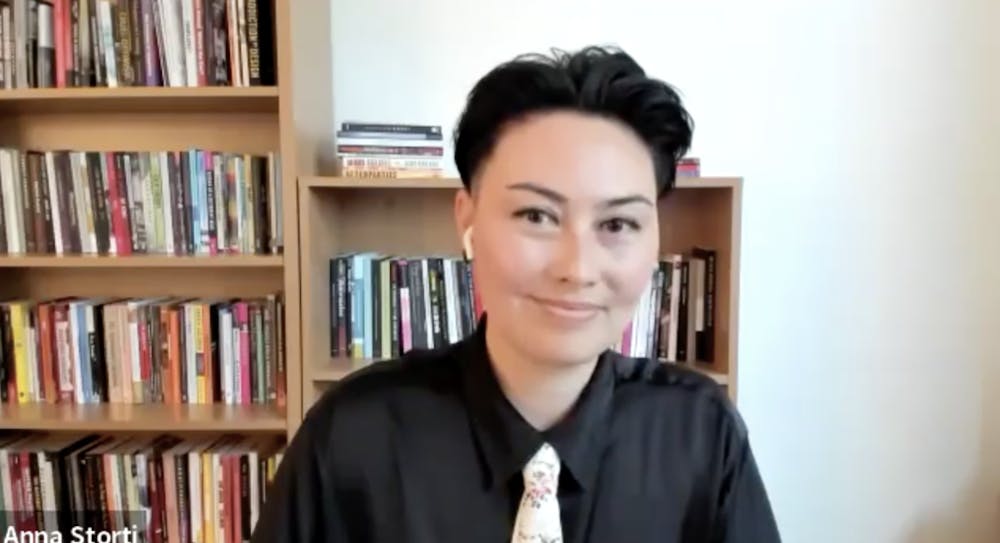A year after the 2021 Atlanta spa shootings, the Duke Asian American Diaspora Studies department spoke with three panelists to confront the historical patterns of violence against Asian women.
During the March 16, 2021 shootings, a man with a self-professed “sex addiction” killed eight women. Six of the victims were Asian women.
Throughout the event, the speakers framed the Atlanta shootings as the result of a larger system of militarized American imperialism, not isolated events driven by hate.
Speakers included Helen Jin Kim, assistant professor of American religious history at Emory University; Vernadette Gonzalez, professor of American studies at the University of Hawai’i at Mānoa; and Kate D’Adamo, a partner with Reframe Health and Justice. Anna Storti, assistant professor of gender, sexuality and feminist studies at Duke, moderated the event.
Storti invited the audience to question why Asian women continue to be victims of violent sexualization, as well as what the shootings mean in the context of the United States and evangelicalism.
“As this violence endures, let us gather and confront the historical patterns that play violence against Asian people, both before and during the COVID-19 pandemic,” Storti said. “The sensationalized and dehumanizing nature of [the victims’] deaths illuminate a deeper history of how the sexualization of Asian women functions as a form of imperial warfare.”
Jin Kim emphasized the importance of the sexualized and violent connection between white, male, Christian evangelicalism and women of Asian descent, a connection she sees as necessary to the context of the Atlanta shootings.
She spoke of the tragedy as a “restaging” of “the mass shootings and the mass casualties of the Cold War in Asia—real wars, hot wars.” Jin Kim noted that these wars taught white evangelical men that Asian women’s bodies were expendable.
Jin Kim also warned against the dangers of religious belief “that has sanctified racialized and militant masculinity as holy,” situating what happened in Atlanta as a result of a larger ideological and political system.
Gonzalez focused her speech on the grim inevitability of the violence witnessed during the 2021 shootings. The shootings were “structurally inevitable because of the scope and nature of militarized imperialism, but also because of the kind of racialized desires that they both cultivate and rely on,” she said.
Gonzalez further argued that white supremacy found its expression through the very same form of American imperialism that led to the Atlanta tragedy, tying the 2021 events once again to patterns of systemic violence.
D’Adamo emphasized the importance of aligning ongoing organizing around abolitionist values and integrating an understanding of sex workers into the ongoing discussion. The solution, she argued, to violence against Asian women is not a greater police presence, which she defined as a carceral response.
“If we align with a carceral response, we are, at the end of the day, aligning with the values of the shooter,” D’Adamo said. “We are asking for a transformation—we are asking for healing.”
She placed the blame for the violence firmly onto the same system of violence the previous speakers had touched on. “It's both the sexualization, the targeting of the interpersonal, but also the targeting of the state that created a type of vulnerability that made this possible,” D’Adamo said.
A focus on hate rather than systemic issues, according to the panelists, is not only overly
simplistic, but it contributes to ignorance of historic trends of systemic violence.
Controversy over #StopAsianHate
During the question and answer session, the panelists discussed the “#StopAsianHate'' hashtag. They agreed that while the hashtag had some benefits, it ended up obscuring the shootings’ root cause because it put the emphasis on interpersonal hate rather than systemic issues.
Jin Kim said that the hashtag made Asian American history more legible to white people, but “it submerged, in some cases, the gendered and sexualized dimensions of what was going on.”
“It’s another form of silencing,” Jin Kim said.
Get The Chronicle straight to your inbox
Sign up for our weekly newsletter. Cancel at any time.
Even interpersonal violence is a manifestation of larger violence at the cultural, social and state levels, according to D’Adamo.
The hashtag “individualizes the issue rather than allowing us to think more systemically about the conditions that create this access to guns, these understandings of Asian women, that perpetuate these acts of violence,” Gonzalez said.
D’Adamo agreed that the hashtag had the effect of decontextualizing the violence from other ongoing protests against systemic racialized violence. “It did not integrate with racial justice conversations, did not integrate with other conversations about policing, and did not integrate with other conversations about abolition,” she said.
Gonzalez also characterized the hashtag as intertwined with anti-Blackness. She said that because the campaign rests on the idea that Asians are “undeserving” of this violence, it “implies that there is somebody deserving.”
“The specter behind that whole thing is anti-Blackness,” Gonzalez said.

Vishal Jammulapati is a Trinity sophomore and an associate news editor of The Chronicle's 118th volume.

